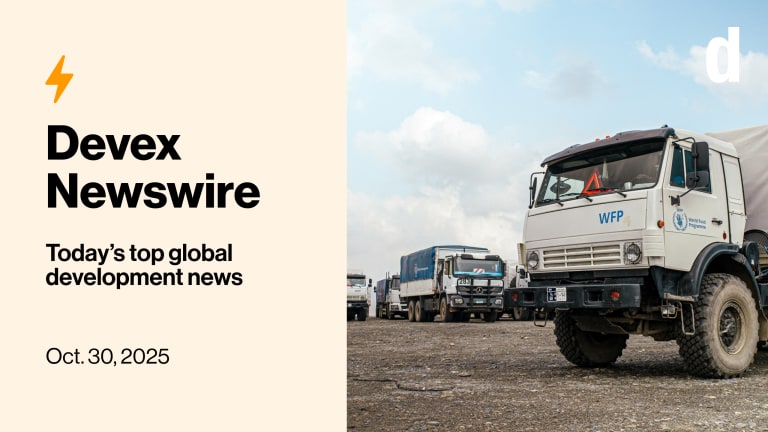
ABIDJAN — South Sudan has been ranked the most dangerous place for humanitarian aid workers for the third consecutive year, according to research by Humanitarian Outcomes.
In the 2018 Aid Worker Security Report, launched Monday, the authors counted 158 major incidents of violence against 313 aid workers in 22 countries last year, in which 139 people were killed. Roughly one-third of attacks occurred in South Sudan.
See more on aid delivery in South Sudan:
► What South Sudan's increasingly fragmented war means for aid delivery
► Q&A: ICRC's South Sudan director on how to deliver aid amid the protracted violent conflict
► Attacks on aid workers, health facilities leave millions in South Sudan without care, report finds
The world’s youngest country has been on a downward spiral marked by civil war, a weakened economy, and limited access for aid delivery since 2013, just two years after gaining independence from Sudan. The United Nations refugee agency estimates that as of June 2018, local violence had forced 2.5 million people to flee across the border in search of safety and had left another 2 million internally displaced.
Rehana Zawar, South Sudan country director at the Norwegian Refugee Council, told Devex that ensuring the safety of a team of 300 local and international staff members is highly challenging due to the levels of insecurity and because some response teams stay in remote areas for up to one month to assist with long-term programming.
Persistent violence in the country has also limited communication capabilities and weakened basic infrastructure, including road networks, making aid delivery both arduous and costly, she explained.
Most attacks on aid workers in 2017 occurred in conflict settings, with about 75 percent taking place in South Sudan, Syria, Afghanistan, the Central African Republic, Nigeria, and Somalia.
The fluidity of these crises has heightened security protocols for international organizations, in many cases forcing national and local NGOs to fill gaps and support the needs of those in the most remote regions, exposing them to greater dangers. As a result, although overall figures on aid worker attacks did not significantly rise compared to the previous year, the report noted “a steep rise in the number of victims belonging to national and local NGOs.”
In South Sudan, 24 humanitarians were victims of shootings last year, 13 were assaulted, and another five kidnapped. The increase in aid worker kidnappings has been a particularly concerning trend. It is an issue that Zawar said didn’t exist in the country a few years ago and which, according to the report, “suggests a troubling trend of armed groups using this tactic to assert control over aid operations.”
As this political conflict turned civil war continues, Zawar is hopeful that recent attempts at a peace deal will finally prove effective.
In June, a “permanent” ceasefire between armed groups supporting current President Salva Kiir and the opposition, led by his former vice president Reik Machar, seemed to be the first step toward ending the four-year conflict. Peace talks between South Sudanese government officials and mediators representing opposition groups included discussions on power sharing, freeing prisoners, and creating a transitional unity government. The agreement also pushed to open corridors for humanitarian aid access.
Mediations resumed last week in an effort to harmonize all requests into a finalized peace agreement before an Aug. 19 deadline. According to the Sudan Tribune, parties are expected to discuss governance issues this week, including the creation of five new ministries, judicial reforms, and the roles and responsibilities of the presidency.
“It is great to see that granting humanitarians safe access for aid delivery is seen as a priority,” Zawar said. “We are optimistic that these peace deals will be implemented and that this will bring positive outcomes for the safety of humanitarians.”








